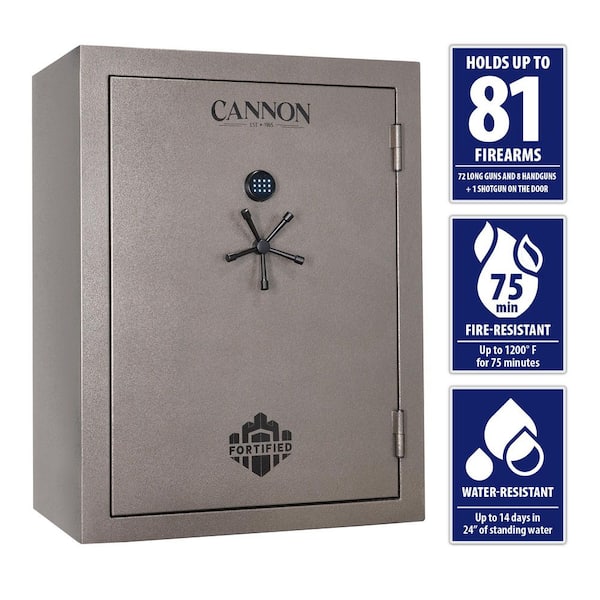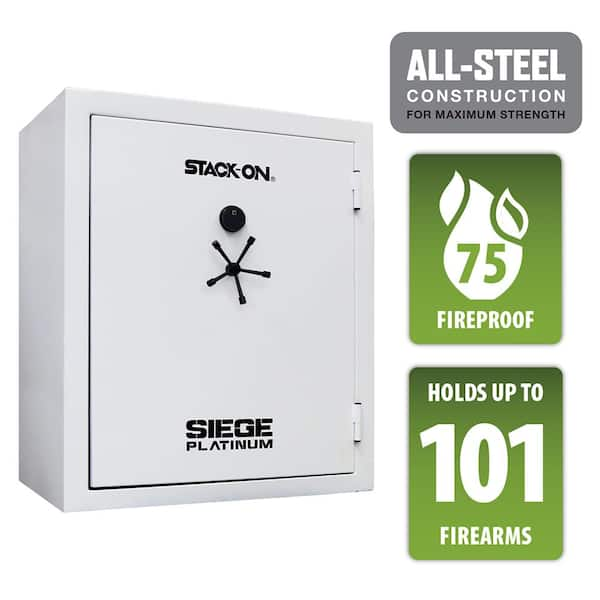If you own a biometric rifle safe, you probably want to keep your firearms not just secure but also protected from damage. One big question many gun owners ask is: Are biometric rifle safes waterproof?
Imagine trusting your safe to guard your rifles, only to find out that water damage has ruined your valuable gear. You deserve to know exactly how well these safes shield your firearms from moisture and what to look for when choosing one.
Keep reading, because understanding this can save you money, protect your investment, and give you real peace of mind.

Biometric Rifle Safes Basics
Biometric rifle safes offer a modern way to keep firearms secure. They use fingerprint technology to allow quick access. This technology improves safety by limiting access to authorized users only.
These safes combine advanced locking systems with strong materials. They aim to protect rifles from theft and damage. Understanding how these safes work helps in choosing the right one.
How Biometric Locks Work
Biometric locks scan fingerprints to identify users. The safe stores authorized fingerprint data in its memory. When a finger touches the scanner, it compares the print to saved data.
If the print matches, the lock opens instantly. This system prevents unauthorized access without keys or codes. It works fast, usually in less than a second.
Common Materials Used
Biometric rifle safes use heavy-duty steel for strong protection. Steel walls resist break-ins and impacts. The thickness varies but often is at least 12 gauge.
Some safes include fire-resistant materials inside. These layers help protect rifles from heat and flames. Weatherproof seals may be added to keep out water and dust.
Rubber or plastic trims are common around the door edges. They help prevent moisture from entering the safe. These materials improve the safe’s durability over time.

Water Resistance Features
Biometric rifle safes often include water resistance features to protect firearms. These features help keep moisture and water out. This protection is vital for safe storage in damp or wet areas. It ensures the rifles and other contents stay dry and secure.
Sealing Mechanisms
Sealing mechanisms stop water from entering the safe. Rubber gaskets line the door edges tightly. These gaskets form a barrier against rain, spills, and humidity. Some safes use magnetic seals to hold the door firmly closed. This prevents water from seeping through gaps. The seals also help keep dust and dirt outside.
Waterproof Ratings Explained
Waterproof ratings show how well a safe resists water. The IP (Ingress Protection) code is common. It has two numbers: one for solids, one for liquids. A higher liquid rating means better water resistance. For example, IPX4 means protection from splashing water. IPX7 means the safe can handle short submersion. Check these ratings before buying a biometric rifle safe. They help you understand the level of water protection offered.
Testing Waterproof Claims
Testing waterproof claims on biometric rifle safes is vital. These safes protect valuable firearms, often in unpredictable environments. Understanding how well they stand up to water damage helps buyers make smart choices.
Manufacturers often state their safes resist water. But only real testing can confirm these claims. Tests reveal how safes perform under different conditions.
Laboratory Tests
Laboratory tests simulate extreme water exposure. Safes face heavy sprays or full submersion. Experts watch for leaks or damage inside. Sensors check moisture levels within the safe. Tests last from minutes to hours. Results show if safes maintain dryness and function. Labs use strict standards to ensure accuracy.
Real-world Scenarios
Real-world tests mimic natural disasters or accidents. Safes undergo rainstorms, floods, or high humidity. Owners place safes in basements or outdoors. These scenarios reveal practical strengths and weaknesses. Real tests show how safes handle long-term water contact. They also highlight any entry point vulnerabilities. Feedback from users adds valuable insight.
Potential Water Damage Risks
Biometric rifle safes offer quick access and security. But water exposure can cause serious problems. Understanding the risks helps protect your safe and rifle.
Effects On Electronics
Water can damage biometric scanners and electronic locks. Moisture may cause short circuits or corrosion. This can make the safe fail to open. Electronic parts often lack full waterproof protection. Even small amounts of water can disrupt sensors. Repairing or replacing electronics can be costly and slow.
Impact On Rifle Condition
Water inside a safe harms rifles too. Metal parts may rust or corrode over time. Moisture can damage wooden stocks and finishes. It can also promote mold or mildew inside the safe. These conditions reduce the rifle’s value and function. Keeping rifles dry is essential for long-term care.
Choosing The Right Safe
Choosing the right biometric rifle safe is important for protecting your firearms. You want a safe that keeps your guns secure from theft and damage. Water can cause rust and ruin your rifles. Knowing if a safe is waterproof or just water-resistant helps you pick the best one. Other safety features also add value to your purchase.
Waterproof Vs Water-resistant
Waterproof safes keep water out completely, even in floods. Water-resistant safes block some water but not all. A waterproof safe offers better protection during heavy rain or floods. Water-resistant safes work well against light splashes or humidity. Choose based on where you plan to keep your safe.
Additional Protective Features
Look for safes with fire resistance to protect against heat. Some safes have seal strips that prevent dust and moisture entry. Anti-pry and anti-drill features improve security. Interior padding protects your rifles from scratches. These features add layers of protection beyond water resistance.

Maintenance Tips For Longevity
Maintaining a biometric rifle safe helps it last longer and work well. Good care keeps the safe secure and protects your firearms. Small actions can prevent big problems and save money.
Follow simple tips to keep your safe in great shape. Regular checks and smart habits improve its life span. This section explains key steps for safe maintenance.
Regular Inspection
Check your safe often for any signs of damage or wear. Look for rust, dents, or loose parts. Test the biometric lock to ensure it works smoothly. Clean dust and dirt from the keypad and scanner. Early detection stops small issues from growing larger.
Preventative Measures
Keep the safe away from wet places to avoid water damage. Use silica gel packets inside to reduce moisture. Avoid storing the safe directly on cold floors or outside walls. Lubricate hinges and locks with proper oil to prevent rust. Protect the safe with a cover if needed during storms or floods.
Frequently Asked Questions
Are Biometric Rifle Safes Water-resistant?
Most biometric rifle safes offer limited water resistance, protecting against light splashes. However, they are not fully waterproof, so avoid submerging them in water.
How To Ensure A Biometric Safe Is Waterproof?
Check the product specifications for IP ratings. Look for safes with high IPX ratings for strong water protection and customer reviews confirming waterproof features.
Can Water Damage Affect Biometric Fingerprint Sensors?
Yes, excessive water exposure can impair fingerprint sensors. Moisture may cause sensor malfunction, so keep safes dry to ensure reliable biometric access.
Do Waterproof Biometric Safes Cost More?
Waterproof biometric safes typically cost more due to added sealing and materials. This investment enhances protection against water damage and increases safe durability.
Conclusion
Biometric rifle safes offer quick access and security. Some models have waterproof features, but not all. Check product details before buying to ensure water resistance. Protect your firearms from moisture and damage. Proper placement helps avoid water exposure. Investing in a safe that fits your needs keeps guns secure and dry.
Choose wisely for peace of mind.